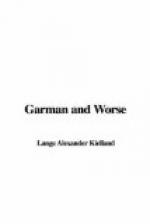When the Consul saw Mrs. Worse come into the room, he imagined that she was bringing a subscription-list to raise the means for educating her son, or something of that sort; and, as he offered her a chair on the opposite side of the table, he turned over in his mind how much he should subscribe. But when Mrs. Worse began to give an explanation of her affairs, according to the calculations of Pitter Nilken, the Consul’s manner changed, and he got up, walked round the table, and seated himself near her. He calmly and patiently examined each paper, went through the calculations and figures, and at last read the draught of a guarantee which Samuelsen had made, with the greatest attention.
“Who has assisted you with all this, Mrs. Worse?” he asked.
“Mr. Samuelsen,” she answered, somewhat anxiously.
“Samuelsen? Samuelsen?” repeated the Consul.
“Yes, that is to say, Pitter Nilken. Perhaps you know him better by that name.”
“Ah yes! the little man in the shop. H’m! Does Mr. Samuelsen wish to go into partnership with you?”
“No. I have asked him, but he prefers to remain in his present position, and give me his assistance in the business.”
The Consul got up with the guarantee in his hand. It was one of his peculiarities that he could not write the signature of the firm except when he was sitting in his usual place. But as soon as he had seated himself in the old wooden armchair, he wrote in a large and bold hand, “Garman and Worse,” taking care to adorn the signature with several flourishes, which he had inherited from his predecessors.
Armed with this document, Mrs. Worse and Mr. Samuelsen set to work at the ruins. The first thing they did was to sell everything there was to sell; but, with the assistance of Mr. Garman, they managed to save the whole of the valuable premises. The front of the house was let, and the old lady moved over to the back, where she took turns in the shop with Mr. Samuelsen. She was at her post from early in the morning till late in the evening, gossiping with her customers, and selling tobacco, tallow candles, salt, coffee, tar-twine, herrings, train oil, paraffin, tarpaulins, paint, and many other commodities.
In the course of a few years Mrs. Worse quite lost her manners. People in polite society had never forgiven her her drive, but still less were they willing to look over the fact that she, a lady, had not more self-respect than to sink down into the position of a common shop-woman. The lower orders, on the other hand, had quite a fellow-feeling for Mrs. Worse, and the dingy little shop was just to their taste; and thus, contrary to all expectation, Mrs. Worse’s business, common little retail affair as it was, went on capitally.




